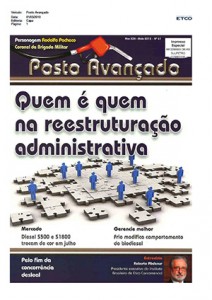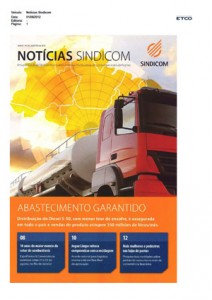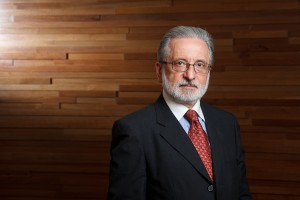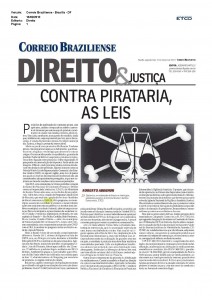Published on 18/02/13 in the Correio Braziliense an article where Roberto Abdenur discusses the importance of fighting piracy and the harm that this illegal activity brings to the country.
Correio Braziliense -18/02/2013 PDF
Tag: Robert Abdenur
2012: A year of challenges and achievements

ETCO's executive president, Roberto Abdenur, gives a quick overview of the institute's main achievements in 2012, which highlighted the inclusion of the fight against corruption on the institution's agenda and the entry of important personalities in the Advisory Council .
The year 2012 established another milestone in the trajectory of the Brazilian Institute of Ethics in Competition. For the first time, ETCO has devoted part of its activities to the debate on corruption and how to eradicate it or, at least, reduce it. The issue of corruption is not outside the scope of competitive ethics. On the contrary, corruption has already been proven to jam the economy and impede the development of a country.
The highlight of the introduction of the topic on the agenda of ETCO's regular activities was the holding, in August, of the international seminar “The Impact of Corruption on Development”. Organized in partnership with the Valor Econômico newspaper, the seminar brought together prestigious personalities in the country, including former STF minister Ellen Gracie Northfleet; the chief minister of CGU, Jorge Hage; the vice president of the World Bank, Otaviano Canuto; the director of Public Governance and Territorial Development at the OECD, Rolf Alter; Congressman Carlos Zarattini and Josmar Verillo, from Amarribo.
As it does twice a year, in partnership with IBRE / FGV, ETCO released the Underground Economy Index, an estimate of activities purposely not declared to the authorities. After five years in decline, the underground economy was stagnant in 2012, remaining at 17%. The main reasons, according to the researchers, lie in the limit reached by the growth of formal employment. The good results of the economy have helped the formal labor market to grow in recent years. However, it should remain stable from now on, even as a result of the rigidity of labor laws and the level of education of the Brazilian. Only by investing heavily in education will Brazil be able to reach the levels observed in developed countries.
The fight against piracy, an important work front of ETCO, gained strength with the adhesion of the city of Vitória to the Cidade Livre de Piratária Program. Launched in 2009, the program is an initiative of the Ministry of Justice, part of the National Plan to Combat Piracy and is managed by ETCO. The cities of São Paulo and Osasco (SP), Brasília (DF), Curitiba (PR), Rio de Janeiro (RJ), Belo Horizonte (MG), Cuiabá, Várzea Grande (MT) and Vitória (ES) have already joined the initiative .
Another highlight of the year was the launch of the book Corruption, Ethics and Economics - Reflections on Competition Ethics in Market Economies, by André Franco Montoro Filho. The work brings together texts produced by the author between 2006 and 2011, a period in which he dedicated himself to the study of the advantages of ethical behavior and the social losses of transgressions.
To crown a year of hard work - we mention just a few highlights above - the ETCO received four new members of its Advisory Board: Minister Ellen Gracie Northfleet, the former Defense Minister and member of the Supreme Court, Nelson Jobim, the rector of University of São Paulo, João Grandino Rodas, and the former chairman of the ETCO Board of Directors, Leonardo Gadotti Filho.
The year 2013 comes with the commitment of ETCO to maintain its strong performance in the areas already conquered and to expand its support and incentive to actions and initiatives linked to competitive ethics, in order to take the issue to increasingly broad layers of society.
Roberto Abdenur speaks to CBN about the Underground Economy Index
ETCO's Executive President - Roberto Abdenur, gave an interview to Rádio CBN on 18/12/12 where he talks about the Underground Economy Index and the stagnation of its results in the last study.
Listen and interview here:
[audio: https: //www.etco.org.br/audio/181212-Radio-CBN_Entrevista-Roberto-Abdenur_IES.mp3]
Download the audio file here (mp3)
Interview with Roberto Abdenur, president of the ETCO Institute
27/11/2012 - Interview with Roberto Abdenur, president of the ETCO Institute
[iframe width = ”600 ″ height =” 490 ″ src = ”http://www.youtube.com/embed/y_vMHd2Lnng?hl=en&fs=1&rel=0 ″ frameborder =” 0 ″ allowfullscreen]Clipping Type: TV
Subject: Miscellaneous
Date: 27/11/2012 - 12:33
Broadcaster: Globo News
Program: Checking Account
Duration: 00:10:17
Corruption Stones Economy
Laws such as fiscal responsibility were a major step forward. But there are others waiting, like the one that punishes the corrupters and the one that legalizes the action of the lobbyists.
Corruption is a factor underlying multiple distortions in the economy. It leads to reduced revenue and increased public spending. It causes damage to society, deprives the poorest of public policies and exacerbates social inequalities. It causes loss of competitiveness of companies. It strengthens the culture of leniency and connivance with situations of transgression.
In its most succinct definition, corruption is the use of a public position for private benefit. In order to prevent the action of corruptors and the corrupt, one must initially analyze the factors that contribute to corruption.
In Brazil, the main “triggers” reside in bureaucracy, high tax burden, complexity in paying taxes, perception of impunity and lack of awareness by society about business ethics.
The cost of corruption can be measurable. The National Confederation of Industry (CNI) estimates that if a country loses $ 1 million in resources diverted from its destination, the loss to the economy as a whole is $ 3 million. This is because the loss is not limited to the unapplied resource. The country is also left without what could result in economic activity resulting from it.
In addition, the impact on the economy is not just internal. The country's external image can be harmed, driving investors and creditors away.
According to the ranking of perception on corruption organized by Transparency International, Brazil is in 73rd place, among 180 countries. This situation also caught the attention of the World Bank. Otaviano Canuto, vice president and director of the entity for Poverty Reduction and Economic Administration, recalls that prevention is done with three basic points: strengthening institutions, transparency and accountability.
In this sense, Brazil advances with the Fiscal Responsibility Law, with the Transparency Portal and with the 8.666 law, which determines that untrue companies cannot be hired by any government agency.
The approval of the Proposed Amendment to the Constitution that creates Ethics Councils in Legislative Assemblies and Municipal Councils will mean a great leap in the path of transparency.
Bill 6826/10 (Anticorruption Law), which establishes punishments for companies that commit unlawful acts against public administration, is also being processed in the Chamber of Deputies. As deputy Carlos Zarattini, PL rapporteur, recalls that among 34 countries studied by the OECD, Brazil is one of three that does not have specific legislation to punish corruptors.
Another possible route is the legalization of the lobby. Congress today houses eleven bills on this. With legalized lobbying, achievements from a specific sector can be shared with all other sectors of the economy.
An environment of unfair competition and opacity in relationships encourages corruption. Serious and articulated measures in the direction of transparency and democracy, such as those listed here, among many others, are the greatest assets to end the "facilities" and create an environment conducive to economic and social development. Healthy and without corruption.
ROBERTO ABDENUR, 70, is a diplomat and executive president of the Brazilian Institute of Ethics in Competition.
Ending unfair competition
 Roberto Abdenur Interview (Posto Advanced Magazine)
Roberto Abdenur Interview (Posto Advanced Magazine)
"The levels of unethical conduct are far above what is desired for a developing nation"
The ethanol path
 Sindicom News August 2012
Sindicom News August 2012
The ethanol path.
By Roberto Abdenur
When he took office as president of Petrobras in February, chemical engineer Graça Foster said that one of his goals will be to increase the participation of the state company in the ethanol market. The statement is positive for anyone who seriously works with ethanol in Brazil, a pioneer country in the development of technology for this biofuel. Petrobras is an important player in the sector, which seeks to reverse one of the main problems in the hydrated ethanol trade: tax evasion.
Regulation of Article 146-A: How to avoid inefficiency
In this article, Roberto Abdenur reinforces the urgency of regulating Article 146-A of the Constitution and draws attention to fundamental points so that the device does not become another simple collection instrument.

Roberto Abdenur, executive president of ETCO
Among the many factors that cause unfair competition between companies in Brazil, is the use of tax evasions to reduce the cost of products and, thus, obtain competitive advantages in the market. On December 19, 2003, the country took a major step towards eliminating this evil, with the publication of article 146-A, resulting from Constitutional Amendment 42/2003. Even today, the complementary law that is essential to regulate the adoption of tax measures necessary to consolidate a safe, healthy and ethical business environment is awaited.
For the time being, only the Federal Government has the competence to institute differentiated taxation systems in order to prevent competitive imbalances caused by the actions of companies that resort to reducing their tax costs to gain spurious competitive advantages. Since December 2003, states, the Federal District and municipalities have been waiting for the complementary law mentioned in article 146-A of the Federal Constitution to be issued so that they can create similar mechanisms applicable to the taxes within their competence.
The provision provides that the differentiated taxation systems adopted by the Union coexist with new special criteria, to be defined not only by it but also by States, the Federal District and municipalities when it is necessary to ensure that the tax burden is uniform for agents competing in the market. .
The text of the article is simple. It says: “Art. 146-A. Complementary law may establish special taxation criteria, with the objective of preventing competition imbalances, without prejudice to the Union's competence, by law, to establish norms with the same objective. ”
The establishment of special criteria, by means of the complementary law referred to in article 146-A, is essential, therefore, to avoid or resolve competitive imbalances. In practice, certain taxpayers may be taxed differently from others, with the aim of leveling the tax burden (tax function), which would otherwise be unequal, thereby preventing any possible competitive imbalance (extra-fiscal function).
Due to the importance of the theme, ETCO has promoted debates over the years, which culminated in the realization, in 2010, of the seminar “Competition Tax Imbalance and the Brazilian Constitution”. Based on the conclusions of the seminar, the Draft Supplementary Law was designed to regulate Article 146-A of the Constitution.
It is essential that the complementary law is correctly formulated, under penalty of ineffectiveness of its provisions, or worse, of becoming just another collection instrument.
The proposed complementary law may resolve situations such as the anticipated collection of the taxable event. In other words, States will be able to charge ICMS in advance, in order to ensure competitive balance in markets that are more susceptible to tax evasion. Another situation that can be resolved is single-phase taxation. According to the tax substitution mechanism, taxes spread over a production chain (multi-phase) are collected at once, as if it were just a tax (single-phase). States already apply this mechanism, but there is no regulation and, therefore, each one does it differently.
In relation to the conflict of competences, the complementary law is vital. The Union already has the competence to regulate markets, but not States and municipalities, whose tax rules are only intended to collect. The complementary law will regulate the matter throughout the country, forcing states and municipalities to act to prevent competition imbalances. As for the minimum values list, the jurisprudence refers to the illegality of adopting minimum values as the basis for calculating taxes on goods and services. The complementary law will allow taxes to be based on market values, to combat fraud that is harmful to competition.
The importance of the complementary law does not stop there. There is also the question of specific rates. It has been increasingly common to create tax regimes in which the rate and calculation basis are merged, in order to charge a fixed amount per unit of merchandise. The complementary law will pacify the issue in relation to federal taxes and allow the use of specific rates by the States.
The complementary law will reaffirm the Union's competence to require the installation of weight, volume or flow meters. In order to make the differentiated tax regimes effective, it is necessary to impose the installation of equipment that allows the control of the quantity of goods traded by the establishment. Such requirements have been questioned, especially in terms of costs (SL 178 / DF).
Finally, two themes should have well-established rules based on the complementary law. Special tax calculation and inspection regimes may be instituted in specific cases and not only based on jurisprudence, which makes it impossible to subject taxpayers to individual different taxation and inspection regimes designed to avoid evasion due to violation of free competition and freedom of initiative. The complementary law will also make it clear that, in the case of sectors subject to a high tax burden, the suspension or revocation of a special registration is justified as a way of discouraging procedures aimed at gaining market through non-payment of taxes.
Click here to access the other articles of this edition




